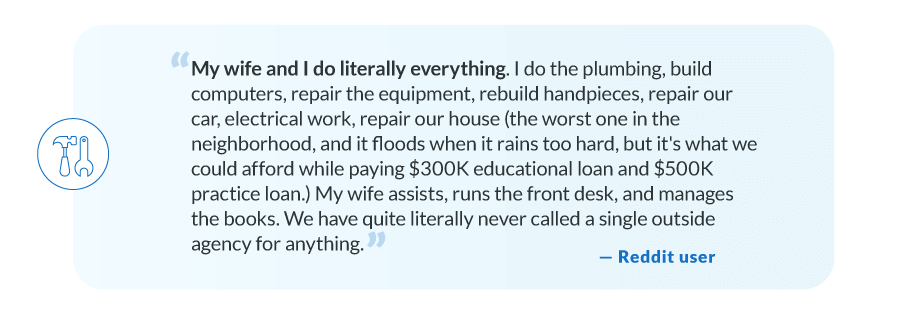Why do some dentists build successful practices while others struggle to stay profitable? In a rapidly evolving healthcare industry, understanding the current job market, industry pressures, and areas of opportunity is key to career success in dentistry. Data from the U.S. Bureau of Labor Statistics (BLS) and insights from real dental professionals reveal that location, business strategy, and adaptability often determine outcomes.
This article breaks down the job outlook, growth areas, and common challenges facing general dentists, orthodontists, and new dentists today. You'll learn what drives success in dental practices, how to avoid pitfalls, and what steps to take for a more stable, high-performing career in dental care.
The Current Dentist Job Outlook
The dentist job market is holding steady, with encouraging signs for both new and experienced professionals. According to the U.S. Bureau of Labor Statistics, employment of dentists is expected to grow 5% from 2023 to 2033 — roughly on pace with the average for all occupations. This includes steady demand for general dentists, along with continued need in specialized areas like oral surgery and orthodontics.
The median annual wage for dentists is $170,910, with some specialties earning significantly more. Many dentist jobs offer full-time schedules and above-average work-life balance, which continues to attract new dentists entering the field. However, location and practice type can heavily influence earnings and job openings. Urban areas often have more saturated markets, while rural regions may offer better opportunities due to provider shortages.
Economic shifts, insurance coverage, and changing patient expectations will continue to shape the job outlook. Still, dentistry remains a strong and rewarding career path with long-term job growth potential.
Factors That Cause Dental Practices To Struggle
While dentistry can be a highly rewarding and lucrative career, not every practice experiences smooth growth. Behind the scenes, many dentists face real challenges that impact profitability, job satisfaction, and long-term success. From demanding patients to billing frustrations and overwhelming workloads, the path to a thriving private practice is anything but easy.
Here are some of the most common struggles that affect dental practices today — and insights from real professionals on how they manage them.
Difficult Patients

Even the most skilled general dentists encounter patients who are difficult to treat — not because of clinical reasons but due to behavior, expectations, or financial issues. As one Reddit user put it:
“How do you deal with difficult patients, in particular the ones who demand treatment to be completed on the day of their exam and refuse to rebook?”
Challenging patients can take a toll on the entire work environment, affecting morale, efficiency, and patient care outcomes. Practices can benefit from setting clear communication standards, enforcing payment policies, and investing in stress management training for staff to maintain a healthy dental health environment.
Managing Teams

Running a dental office means managing more than patients — it also means managing people. For practice owners, balancing leadership, delegation, and decision-making can lead to burnout if not handled carefully. A Reddit user explained:
“Some days, it's like getting pecked to death by penguins. Every team member comes to you with every small issue, one right after another. You can constantly have to make decisions all day, and decision fatigue can make you not think clearly when you have to make larger ones. A balance between delegation and keeping control of the overhead for me.”
This quote captures the strain that many dentists and dental assistants feel in a high-pressure work environment. Building a supportive team culture, setting clear roles, and empowering the team lead to handle day-to-day issues, from interpersonal issues to payroll, can help reduce decision fatigue and make practice management more sustainable over the long term.
Task overwhelm

For some dental professionals, especially those in solo or family-run offices, the line between personal life and work can blur completely. A Reddit user offered a raw look at what that can look like:
“My wife and I do literally everything. I do the plumbing, build computers, repair the equipment, rebuild handpieces, repair our car, electrical work, repair our house (the worst one in the neighborhood, and it floods when it rains too hard, but it's what we could afford while paying $300K educational loan and $500K practice loan.) My wife assists, runs the front desk, and manages the books. We have quite literally never called a single outside agency for anything.”
This situation isn't rare — many dentists fresh out of dental education dive into practice ownership without realizing how much non-clinical labor is involved. To avoid burnout, dentist jobs in general dentistry must include boundaries, outsourcing where feasible, and long-term planning to support work-life balance as the business scales.
Factors That Help Dental Practices Thrive
While many dental professionals face steep challenges, others find ways to grow successful, stable practices — even in competitive markets. What sets thriving practices apart is often their ability to apply smart, strategic decisions that build trust, boost efficiency, and attract a steady flow of patients. Whether it's using a loan to invest in new technology, participating in insurance networks, or relying on patient referrals, these practices tend to prioritize long-term sustainability and consistent patient care.
Here are a few proven strategies that help dental practices stand out and succeed.
Word-of-mouth referrals

Reputation is everything in dentistry. When patients trust their provider, they become your most powerful marketing tool, making word-of-mouth just as powerful as investing in any other marketing venture (which Clarify Capital can help you find funding for!). A Reddit user shared:
“So, I was putting together a little literature about our practice and realized that almost all of our new patients come from word-of-mouth referrals. We barely spend on marketing because our existing patients do it for us. It really comes down to trust.”
Dentists who consistently deliver excellent patient care and build strong relationships often see organic growth through referrals. This is especially effective in general dentistry and private practice settings, where personalized attention and continuity of care drive patient loyalty. A focus on communication, reliability, and positive outcomes in dental services can fuel long-term success without heavy reliance on advertising.
Equipment and technology investment
Technology has become a game-changer in modern dentistry.

Digital tools can streamline workflows, reduce chair time, and enhance patient experiences. A Reddit user described the impact of investing in digital scanning tools:
“Scanners are totally worth it… Scanning will definitely reduce your chair time, and ANY DAs can scan — you just check their work afterward, which means you don't have to waste time taking impressions. If you miss a margin with scanners, all you have to do is rescan that one spot.”
Funding an equipment purchase like this not only improves the efficiency of dental procedures like root canals and orthodontic work but also enhances preventive care efforts. For busy dental offices, upgrading equipment can lead to faster turnaround, better results, and more satisfied patients — all of which support practice growth.
Being a Network Provider

Insurance participation remains a hot topic in the dental field. While some dentists prefer to avoid network restrictions, others find that joining insurance plans helps grow their patient base quickly — especially early in their careers. One Reddit user shared this approach:
“Insurance — some people are very against this, but if you want a lot of patients quickly, go in-network with the biggest insurance companies in your area. Yes, it's rough on your profit margins. Think of it like a marketing expense. Eventually, when you have a solid patient base, you can drop a lot of these plans. You'll still keep a lot of those same patients if you're treating them well.”
This strategy can be particularly useful for new dental offices trying to establish a foothold. While insurance contracts may reduce per-procedure revenue, the consistent volume of patients helps build stability. It also supports work-life balance by providing more predictable scheduling and income. For dentists evaluating their career path, becoming an in-network provider can serve as a practical stepping stone toward more selective patient models or specialized dental services later on.
Dental Practice Growth FAQ
As the dental field continues to evolve, professionals at every stage of their careers have questions about how to grow their practice, expand their skills, or choose the right path within the industry. Whether you're a general dentist just out of dental school or an experienced provider looking to specialize, understanding the options, requirements, and opportunities available is key to long-term success.
Below are some frequently asked questions about career growth, advanced roles, and practice development in today's dental landscape.
What Are the Most In-Demand Dental Specialties Right Now?
Dental specialties such as oral and maxillofacial surgeons, endodontists, pediatric dentists, and prosthodontists continue to see steady demand. These roles often involve more complex procedures, which allows providers to charge higher fees and build referral-based practices.
Do I Need Additional Certifications or Licensure To Specialize?
Yes. Most specialties require a postdoctoral residency program, along with specific certifications and licensure beyond general dentistry. The American Dental Association (ADA) recognizes several formal dental specialties, and each has its own training and credentialing process.
How Can General Dentists Grow Their Practice Without Specializing?
Growth doesn't always mean specialization. Many general dentists grow by expanding services, hiring additional dental hygienists, investing in new technology, or focusing on cosmetic and preventive procedures that are in high demand. These things require funding, and Clarify Capital can help! Apply today and get funded in as little as 24 hours.
What Designations Should I Consider After Dental School?
Beyond a DDS or DMD, dental professionals can pursue designations such as FAGD (Fellow of the Academy of General Dentistry) or MAGD (Master of the Academy of General Dentistry). These titles reflect a commitment to continuing education and can boost a dentist's reputation in the community.
Is Specialization Worth It for Long-Term Career Growth?
For some, absolutely. Specializing can lead to higher income potential, more referrals, and a narrower, more focused scope of work. However, the decision depends on your personal goals, financial situation, and passion for a specific area of care. Each dental specialty comes with its own rewards and challenges.
Planning Your Next Move in Dentistry
The dental field is full of opportunity — but success isn't guaranteed. While some dentists enjoy steady job growth, strong patient demand, and solid work-life balance, others face operational strain, reimbursement hurdles, and burnout. This article explored the gap between thriving and struggling dental practices, offering insights into what drives long-term success in general dentistry and beyond. From understanding the job outlook and dentist salary trends to managing patient care and investing in technology, growth comes down to making informed, strategic decisions.
Dentists looking to expand their career path or build a more sustainable business must keep an eye on the evolving job market and adopt best practices that align with patient expectations and their own professional goals. Whether you're just out of dental school or running a busy practice, now is the time to assess your model and plan for the future. A thoughtful approach to managing your dental services can improve profitability, strengthen oral health outcomes, and support long-term career satisfaction.
Ready to invest in your practice or take the next step in your career? Apply for fast, flexible funding at Clarify Capital.

Michael Baynes
Co-founder, Clarify
Michael has over 15 years of experience in the business finance industry working directly with entrepreneurs. He co-founded Clarify Capital with the mission to cut through the noise in the finance industry by providing fast funding and clear answers. He holds dual degrees in Accounting and Finance from the Kelley School of Business at Indiana University. More about the Clarify team →
Related Posts





